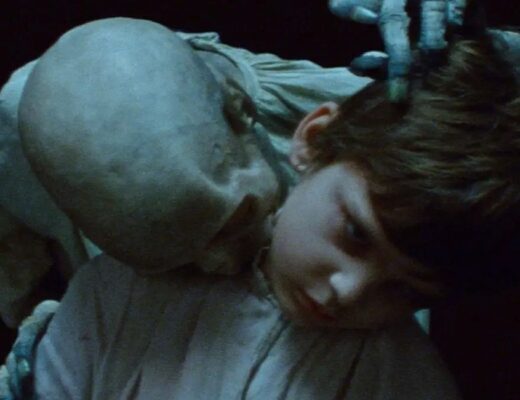Sharrock’s middlebrow approach and sitcom-ready style undermines much of Limbo‘s potential power.
About a decade ago, Serge Daney’s then recently-translated essay “The Tracking Shot in Kapo” began making the rounds in cinephile circles. Like most dense, complicated film writing, many of its finer points got dulled in the rush to comment upon or otherwise utilize the writing for further rhetorical purposes. But Daney’s main argument, inspired by a decades-old review by Jacques Rivette regarding an “abject” moment in Gillo Pontecorvo’s 1964 film Kapo, was that aesthetics are a kind of morality. Or, in other words, how something is filmed is as much a part of a film’s meaning as the plot or dialogue — form is content. This assertion comes to mind while watching Ben Sharrock’s Limbo, in which the very real plight of refugees forced to sequester in unfamiliar foreign countries while waiting for official asylum is twisted and mangled like a square peg squeezed into a round hole until it becomes feel-good, sitcom-ready pap. It’s almost surprising that the film doesn’t come with a laugh track.
Set in a small, fictionalized Scottish town (although filmed in Uist, part of the Outer Hebrides of Scotland), Limbo is mostly a collection of quasi-comedic vignettes that coalesce around Omar (Amir El-Masry), the newest arrival in the community. Omar rooms with Farhad (Vikash Bhai), as well as brothers Wasef (Ola Orebiyi) and Abedi (Kwabena Anash). They’re all from different places; Omar is Syrian, while the others hail from Afghanistan and Nigeria. Omar makes occasional phone calls to his parents, who have also fled Syria, and frets over being compared to his older brother who stayed in Syria to fight. His parents ask for money and constantly inquire if he’s keeping up with his oud, a musical instrument that Omar carries with him at all times. He has a broken hand that keeps him from playing the instrument, and it in turn becomes a symbol tethering him to his past, as well as a kind of albatross. Otherwise, the film doesn’t seem interested in the men’s cultures or what they left behind. Instead, everything is filtered through Euro-centric pop culture references; Farhad is obsessed with Freddie Mercury and Queen, while Wasef and Abedi bicker about Ross and Rachel from Friends. There are assorted hijinks, as Omar visits a bodega run by another immigrant, encounters some slight racism from the locals, and deals with Farhad stealing a chicken and keeping it as a pet. Ennui eventually settles in, as Sharrock dispatches with the comedy to focus on Omar’s existential loneliness and familial obligations, but by the time someone has turned up dead, the pathos feels largely manufactured.
Reviews have listed all the aesthetic touchstones that Sharrock references here, including Wes Anderson, Aki Kaurismäki, Eli Suleiman, Bill Forsyth, and even Yorgos Lanthimos. What all those directors have in common is a certain deadpan sensibility, largely predicated on carefully symmetrical compositions and low-key physical comedy. Sharrock sets the tone from Limbo’s very first scene, a sex education tutorial that finds a man and woman pantomiming a dance routine that leads to unwanted groping. It’s comically exaggerated, filmed in that aforementioned symmetrical setup with an eye towards pictorial whimsy. Omar and the others sit in the audience, the camera cutting from the routine to them and back, a heavy-handed punchline that introduces these refugees as nothing more than passive spectators. Much of the film proceeds in this manner, with the men always reacting towards something. Certainly, their passivity is part of the point; as is made abundantly clear, this is an extended purgatorial existence. Still, the lack of even a little bit of agency rankles.
There are things to like here. The entire cast is very good, with El-Masty a particular standout. Any humanity the film possesses comes through these performances, even if they don’t always seem like fully-formed, well-conceived characters. Too frequently they’re simply cogs in Sharrock’s sketch comedy routines, and scenes of real hardship and emotional distress sit uncomfortably next to all the antics. Eventually shedding his cast, Omar is unwilling to play his oud, and the film builds to his eventual embracing of the instrument, suggesting in the process that he’s finally accepting both his brother and his place in this strange new world. But even that climactic moment is undercut by Sharrock, who allows a few moments of beautiful instrumental music to play before phasing it out in favor of the film’s generic, non-diegetic score. There is, of course, no need for every film about refugees to be all doom and gloom; not everything has to be a hard-hitting documentary. But Limbo feels an awful lot like the kind of film designed to please American arthouse denizens, pleasant and uplifting and making sure not to ruffle any feathers in the process. Audiences might leave theaters vaguely satisfied, but the film’s middlebrow approach doesn’t inspire much more.







